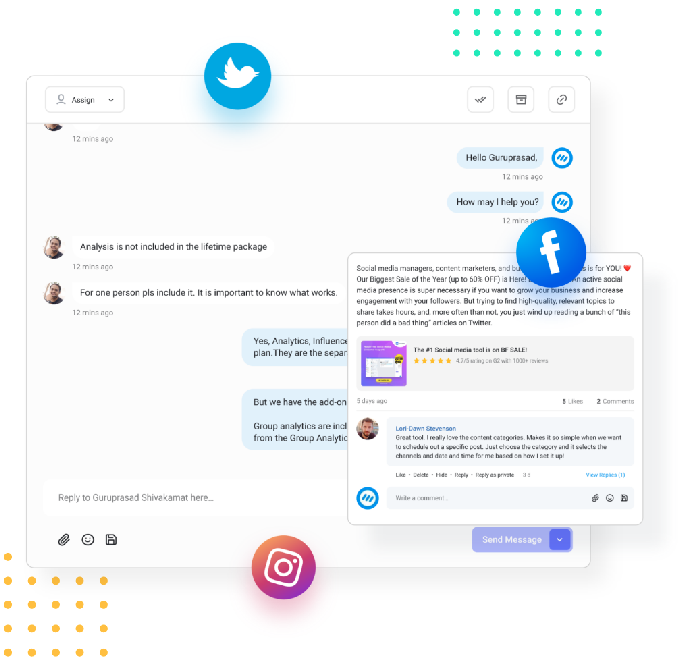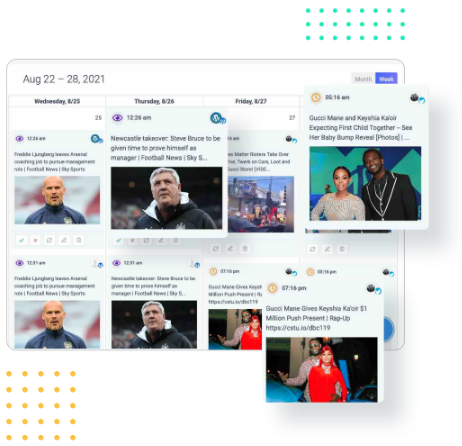Despite engaging with and acquiring millions of people, many businesses have yet to adopt social media recruiting.
It takes some effort to do social media recruiting right. But it can be a decisive advantage when done well. This article will provide you with all the information you require to get started.
Organizations are increasingly competent at using various venues to recruit new personnel as social media grows. According to The Muse, 92 percent of businesses utilize social media to acquire employees. Millennials and Generation Z are pretty confident in their ability to advance their jobs through social media. According to Capterra, 73 percent of 18-34-year-olds found their most recent employment using social media.
Recruiters frequently use social media to learn more about current candidates. But few are taking advantage of these platforms to their full potential for recruitment and hiring social media virtual assistants. Many hiring teams are just beginning to realize how solid social hiring can be. There has been extensive use of recruitment tracking. So there’s plenty of space for development in social media recruiting.
What is social media recruitment, and how does it work?
Social recruitment is the practice of attracting candidates via social media platforms like LinkedIn, Facebook, and Twitter or other websites such as online forums, job boards, and blogs.
Social media recruiting, social hiring, and social recruitment describe social recruiting.
While most organizations have utilized social recruiting to supplement more traditional recruiting approaches thus far, this may change as social recruiting becomes more prominent. According to one research, nearly three-quarters of workers aged 18 to 34 discovered their most recent employment using social media.
(Also read up on Social Media workflow and Social Media for Commerce)
Social Media Recruitment: Quick Facts
When done correctly, social recruitment allows companies to reach out to passive candidates, collect more recommendations, target targeted individuals, promote their culture, and save money.
-
-
- Surprisingly, 73 percent of millennials found their last employment using social media. This trend is sure to continue, as the average member of Generation Z — which will add 61 million workers to the workforce over the next few years — has seven social media accounts.
- Not only have that, but 82 % of organizations used social media to recruit passive applicants. Companies that use social media for recruiting have seen a 50 % boost in candidate quality.
- When it comes to job searching, 96% of people use social media.
- 49% of professionals use social media to follow organizations to stay informed about career chances.
- 81 % of job seekers prefer to see job postings on Facebook.
- Also, recruiters expect social media recruiting to expand by 78 %.
- In 2020 and beyond, 46 % of businesses plan to invest in social media recruiting.
- Between 2017 and 2020, Instagram recruits more than doubled.
-
Finally, using social media for recruitment succeeds because it places your company in the orbit of where employees spend a significant portion of their time: social media.

Also Read: How To Write A Client Winning Social Media Proposal
Application of social media in recruitment
It is a more efficient and cost-effective alternative for proponents of social recruiting to traditional internet recruiting sites such as Indeed.com.
The following are examples of social media in recruiting practices:
-
-
- Using LinkedIn to find suitable applicants.
- Sending a Facebook direct message to a possible candidate.
- Tweet links to open positions with relevant hashtags.
- Make videos to distribute on your company’s YouTube, Facebook, or Instagram sites that showcase and outline your company’s culture.
- Related Read: How To Start A Social Media Marketing Agency In 2025
-
Why use social media for recruitment?
By no means is social media a new instrument for recruiting. You’d think that with the surge in popularity of LinkedIn, Twitter, and Facebook in recent years, a considerable number of recruiters and HR professionals would be using it for job postings.
Over the years, the number of employers who utilize social media to study job seekers has risen dramatically. In 2006, only 11% of organizations used social media to recruit.
And in 2017, more than 80% of organizations used social media to recruit.
The most common application of social media recruiting is to find potential candidates, including passive prospects. Others use it as a research tool to see if there is any information to verify people’s histories and qualifications. Others are interested in seeing if a prospect has a professional internet presence.
However, many recruiters still do not use social media during the hiring process while knowing fully well their target audience is generation Z.

But why should you use social media to recruit, and what advantages does it provide your HR department?
1. You can reach out to folks who are currently unemployed
When you only use job boards to post your openings, you’re limiting your reach to people looking for new jobs. Social networking is a terrific way to reach out to that coveted pool of people who aren’t looking for a new career. But they would consider changing if the right opportunity presented itself. It is especially true when hiring for specialized positions like Developers or Engineers.
In the competitive field of technology, these specialized skills are in high demand. Also, there is a national skills scarcity, and candidates, particularly in the areas of fintech development, are more likely to be snatched up quickly. Embracing diverse recruitment strategies can be key to finding the right talent in this rapidly evolving market.
2. You can flaunt your company’s culture
Your company’s website and careers page are excellent venues to promote your values and how fantastic your employer is.
However, fewer businesses use their Twitter feeds and LinkedIn company pages to share images of their employees. They also keep their followers up to speed on the news and advertise job openings.
When you share this type of material will reach those already following your company on social media. And who better to come work for you than your brand’s most ardent supporters?
3. It helps screen candidates
Social media is a tool that some employers use to screen prospects.
When evaluating their application, you can analyze a candidate’s skills, previous experience, and personal traits. However, you can’t assess compatibility with your company’s culture and principles. Here’s where the social media audit comes in handy.
Of course, evaluating someone’s social media profiles without their permission is risky; nonetheless, an increasing number of candidates are providing links to their LinkedIn, Instagram, and Twitter pages in their CVs.
4. It’s free to use
Okay, so there are some paid features on social media. Paid advertising, such as LinkedIn Job Posts and Job Slots, and a Recruiter License, is costly. However, posting your job openings on your LinkedIn corporate page, Twitter, or Facebook is free.
So, why not use your social media profiles to your advantage? Just keep track of your progress and report on it to discover which platform is the most beneficial.
So, if you don’t have time to post your job openings on social media, talk to your marketing staff. You can take their help and collaborate with them.

Master Social Customer Care and Support
Manage your brand’s social presence by monitoring and managing incoming messages and comments across your social networks.
14 days free trial – no credit card requiredHow to use social media for recruitment?
When you publish a position on your company’s social media page, you can use the networks of your followers and workers to spread the word quickly:
-
-
- You publish a new job opening on your company’s Facebook page.
- The post is shared with your followers and workers’ networks.
- Your reach expands enormously, increasing your chances of finding the ideal individual.
- Platforms for social media recruiting
-
Twitter, Facebook, Instagram, and LinkedIn are all possible social recruiting sources. Organizations can use Twitter to share job postings, company news, and other information. Similar options are available on Facebook, including sharing photographs and videos. Instagram is a great place to publish pictures and videos.
So post about your company’s culture, new goods and services, and so on. Furthermore, many social media sites have extensive search capabilities useful for social recruiting. Hence, these sophisticated capabilities can help you discover more about your social recruiting’s current audience. Also, they allow you to target the proper groups in the future.
1. Facebook
Facebook’s Graph Search lets you look up information about a user’s location, interests, and fields of study, among other things. For example, you may look for “people interested in SEO marketing who live in Los Angeles.”
2. Twitter
Although Twitter’s Advanced search has fewer features than Facebook’s, it still allows you to find people by searching for specific phrases, hashtags, and keywords.
3. LinkedIn
LinkedIn is the most successful social media medium for social recruiting. The entire site uses a wide range of capabilities to assist your corporate culture and recruit potential employees because it is designed for job seekers, employers, and professional networking.

An Advanced People Search is also available on LinkedIn. Recruiters will like the search features of this tool. Many of these search tools are completely free. Some, on the other hand, require a LinkedIn premium account.
You need to develop an understanding of Social Media Algorithms to utilize them to your benefit.
Related Read: 9 Social Media Management Strategies for Agencies
How to build a social media recruitment strategy?
So are you ready to incorporate social recruiting into your talent acquisition plan?
Here are some crucial steps to a successful social media recruitment strategy.
1. Set objectives and benchmarks
If you don’t create targets and benchmarks, you won’t know if your social media recruitment strategy is effective.
Do you want to boost the number of people who apply? Reduce the time it takes to hire someone? How can you find more qualified candidates? Choose metrics to help you track your progress toward those objectives, then assess how your existing recruiting strategy stacks up.
The following are some of the most popular KPIs for using social media for recruitment:
-
-
-
- Time spent on each candidate
- The cost of each rental
- Participation in social media
- Employee Recommendation Rate
- Offer acceptance rate (clicks from social media to your employment website)
-
-
2. Make a list of your preferred prospect
You can better target that type through social recruitment after knowing what experience, attributes, and talents make up the ideal applicant for a role.
You should also consider factors such as location, and whether the position you’re recruiting for is fully remote, in-office, or a combination. You can then screen potential candidates depending on whether you’re hiring in the United States, for example, or if you’d consider remote applicants from other locations.

Social Media Calendar for Digital Agencies
Organize all your social posts and visualize your client’s social media content plan with an interactive Content Calendar
14 days free trial – no credit card required3. Select the appropriate social media channels
You could put everything on every platform, but that’s not a good plan. Determine where your employees and ideal prospects spend their online time, then select the best social media recruiting tools.
Choosing the correct social media sites necessitates prioritizing certain types of material. If you want to use Instagram to recruit, you’ll need to concentrate on visual content. Curate a mix of text, photographs, videos, and links if your candidates are more likely to be on LinkedIn.
4. Do some research on your competitors
Is there a robust social media presence among your competitors? If that’s the case, are they using their accounts to recruit?
You don’t have to be in the same places as your competition. Knowing where they post can help you figure out what you’re up against. It will help you even if their social recruitment postings produce high levels of engagement. On the other side, if their social recruiting does not appear to be engaging, you can learn what not to do. Also, you may discover gaps where your posts will stand out.
Examples of Recruitment via social media
Notably, if a company actively controls its employer brand, 75 percent of active job seekers are more inclined to apply for a job. The dedicated staff is typically required to supply the company’s employment page with enjoyable, culture-related content and respond quickly and thoroughly to evaluations and inquiries. It’s a big task, but these five companies are doing a fantastic job.
1. Cactus Club Café
Look at the Cactus Club Cafe for an example of TikTok recruiting. A separate account dedicated solely to recruitment features behind-the-scenes footage of what it’s like to work at the facility. Hiring announcements are routinely circulated between amusing dance videos and drink pour reels. Thus, Cactus Club Cafe has perfected the use of video to attract and hold the attention of its audience.
@cactusclubcafe Coffee breaks on the HQ rooftop ☕️ ???????? #cactusclubcafe #lifeatcactus #joblove #handchallenge #handclapchallenge #fyp ♬ Hands Clapping – ????89????
2. UPS Jobs
UPSJobs includes job ads as well as information on the company’s culture. In job posting tweets, UPS utilizes the hashtag #FutureYou. And it uses the page’s Twitter bio reads, “Future You is a UPS employee.” They make followers feel like they’re a part of the team. Also, they highlight what it’s like to work at UPS.

3. Verizon
Verizon is one of many businesses that have jumped on board with a rising trend on Facebook. Dedicated career pages like Verizon Careers use Facebook’s page management features to promote positions. Also, they share information about their business culture.

Verizon’s Facebook page includes reviews, photos, videos, and more. Through this, it makes the most of its 218,000-strong audience.
4. Zappos
In 2014, Zappos made headlines with a strictly social strategy to recruiting, taking a somewhat different method.
Some platforms were more adapted to the transfer than others. While Inside Zappos is still active on Twitter and Facebook, the YouTube channel eventually merged with Zappos’ main YouTube account. The most recent Instagram post from Inside Zappos was in 2018.
5. Capgemini
Capgemini, a multinational computer business based in France with over 270k workers in over 50 countries, focuses on social recruiting. They started a social media series called Her Story, which focuses on female employees’ stories.
These examples demonstrate Capgemini’s commitment to helping women break over the glass ceiling. The series benefits both the firm and the candidates because it fosters a positive work environment that encourages diverse people to apply for open positions.
- Related Read: How Agencies Collaborate on Content Marketing Ideas?
6. Deutsche Bank
Deutsche Bank has a dual education program where employees can combine an apprenticeship with a Bachelor’s degree. As students approach graduation day, the bank erected a social wall to highlight their stories and celebrate their accomplishments.
The feed is embedded on the bank’s careers page so that others can see it and be inspired to apply.

7. NHS
NHS Employers in the United Kingdom initiated a hashtag campaign to revitalize the NHS workforce at the beginning of 2016. At the time, only 6% of NHS employees were under 24.

The #NHSwhereIStarted initiative urged those who had first entered the workforce through the NHS to describe how they got started to inspire the next generation to work for the national healthcare service.
The campaign’s fundamental concept was to post a photo of one’s first day at the NHS and nominate two other people to post their own “first-day” photos. As a result, NHS employees of all types were forced to share their career trajectories.
Related Read: Social Media Approval Workflow for Agencies: A Step-by-Step Guide
Benefits of social media recruitment
Social media usage in talent acquisition has grown increasingly crucial as recruiting companies compete for top talent. Indeed, social networking sites are currently used by over 90% of all recruiters during the hiring process. The following are eight advantages of incorporating social media into your recruiting marketing strategy:
1. Candidates of Higher Potential
Many companies’ self-reported statistics demonstrate that they get high-quality prospects when they recruit through social networking sites.
Furthermore, they are likely to be up to date on developing business trends. This will enhance the talents they bring to the table. Again, suppose you opt to use your employees to publicize new job openings at your firm via social media. In that case, the people you hire are more likely to remain longer and be more productive.
2. Reduced Hiring Cost
Recruiting can be a very expensive process. Despite the fact that social recruiting is less expensive, it can still be quite costly. Regardless, the value you get from the hires you find through social media networks makes this a very cost-effective method.
Almost often, the costs of recruiting via social media are cheaper than those of other approaches. A simple Facebook ad, for example, can provide you with over two times the visibility of traditional recruitment strategies such as classified ads in newspapers and job boards.
3. Reduce Hiring Time
Traditional recruitment tactics take longer to complete than social media recruitment approaches. It means you can use social media if you need an employee as soon as possible. Candidates can contact them more easily and quickly on social networking sites, but they can also answer more quickly. As a result, excellent working relationships are frequently formed.
Furthermore, recruiting from a talent pool of people who have the same beliefs, interests, and work styles as the hiring manager or organization typically speeds up finding the right person for the job. It is fantastic news for both the hiring party and the candidates hoping to work for your company.
Tips for creating an effective social media recruiting process
Your social media must recruit an approach to be unique to your business. Determine your social media brand to attract potential candidates’ attention. The following are the necessary actions you must take to get started:

1. Create shareable content
It’s not simply about spamming open positions and sourcing on social media. It’s the ideal time to promote your company. Showcase what it’s like to work for your organization and employee accomplishments. Give individuals who are currently unemployed a cause to apply for a job. Make shareable material that is consistent with your brand. You can also find shareable content in blogs, news stories, and appropriate memes.
2. Let your employees participate
So encourage your team to participate in your social media marketing efforts. Your staff will have a network of like-minded individuals who may be ideal candidates for one of your positions.
3. Make connections with recruiters
Having a social media presence for your in-house recruiting staff is becoming increasingly desirable. Please encourage them to advocate for your brand by sharing material like your staff. The distinction is that your recruiters should have their brand on the internet. Please enable them to concentrate on building genuine relationships with the people you wish to hire.
Also, join organizations, participate in debates, and even attend events and conferences to know them better. You can have them be completely open about their motives. Thus, their presence will impress any possible prospects in a market where the candidate wields the majority of the power. Taking the time to connect pays off truly.
Related Read: How to Build an Accomplished Social Media Team for Your Agency
4. Make sure you’re in the right place
Engaging talent won’t be effortless if you don’t have the proper dialogues with the right individuals. Participate in debates and be active in Facebook and LinkedIn communities. Also, to reach your Twitter audience, use appropriate hashtags.
5. Use targeted advertisements
In addition to publicizing your new job vacancy on social media, consider using customized advertising. Targeted advertising is a convenient approach to reach out to inactive prospects on the internet. Targeted advertising is available on all of the social media platforms mentioned. To ensure that the proper people see them, you may target your ads based on geography, age, education, hobbies, and other factors.
Related Read: How to Find Social Media Clients for Your Agency
6. Create personas for Ideal Candidates
Tailoring your strategy to the suitable talent pool may take time and effort. So, first and foremost, you must create candidate personas for the positions you wish to fill. It will allow you to speak with your ideal candidates directly. You can research personas in a variety of ways. For example, you can conduct interviews or surveys with current employees to learn more about what makes a successful employee at your company. You can create personas by focusing on your employees’ goals, interests, and pinpoints.
Also Read: How To Manage Post Approvals With ContentStudio
7. Verify Candidate Information Using Social
Media Content posted by potential candidates on social media can assist you in verifying things that they indicate on their CV. The goal is to identify the appropriate fit for your culture, not discriminate against individuals based on religious beliefs or social activities. Based on practical exams, examinations, or skills, make your final hiring judgments. Recruiters know how some job applicants inflate their degree or prior work experience to get an advantage. As a result, using social media to verify applicant information is an excellent idea.
Take away: To keep elite talent, recruit via Social Media!
Keeping your employees engaged at every stage of their careers contributes to productive and rewarding workplace culture, from recruitment to retention. While social recruiting is a fantastic fit for today’s job seekers, firms must follow up with a streamlined hiring process as well as significant onboarding and retention initiatives.
Firms need a well-designed social strategy that spans everything from recruitment to retention to establish a strong team and stay ahead of the competition. When you’re continuously backfilling responsibilities or dealing with regular turnover productivity and morale issues, it isn’t easy to create a new structure for promotion and advancement.
The capacity to engage your employees in an environment that promotes respect, room for growth, and empowerment are more important than the wage or bonuses in your culture, recruiting, and retention efforts.

Analyze, Understand, and Improve Your Social Strategy
Stack your key social metrics against those of your competitors and make targeted steps towards social media success.
14 days free trial – no credit card required